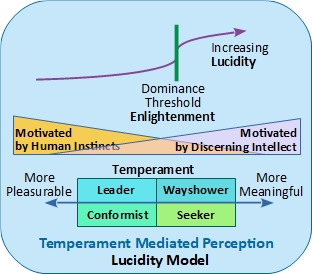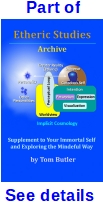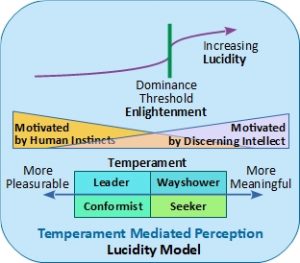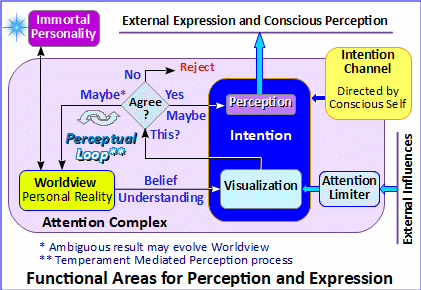Opinion 9
Abstract
 This Opinion includes introduction of the Temperament Mediated Perception (TMP) model. Although the first appearance with this title, the model has been evolving from the early version discussed in the Implicit Cosmology. As it stands now, I believe it is largely complete. Future writing will be concerned with explaining its implications. It should not be considered true until it is vetted by informed reviewers. (Watch ethericstudies.org for updates.
This Opinion includes introduction of the Temperament Mediated Perception (TMP) model. Although the first appearance with this title, the model has been evolving from the early version discussed in the Implicit Cosmology. As it stands now, I believe it is largely complete. Future writing will be concerned with explaining its implications. It should not be considered true until it is vetted by informed reviewers. (Watch ethericstudies.org for updates.
In brief, TMP is the argument that our perception is passed to our conscious awareness by way of our mostly unconscious mind, influenced by human instincts and colored by learned expectation. The core perceptual process appears to be moderated by inherited temperament-related traits.
My intention in writing this Opinion is to explain the relationship between unconsciously sensed and consciously perceived information with emphasis on the need to consciously intend to see reality as it is, rather than how we are taught
To people skeptical of dualism: The conclusions described here apply whether we continue after physical death or cease to exist when we die. Each of us has a humanitarian potential and an instinctual potential. Which way we turn determines our contribution to the community. In what kind of world do you want your children to live?
Temperament Mediated Perception
I am proposing in this Opinion a model to help explain observed characteristics of mind. From my study as a layperson, it appears that theories of consciousness do not or only partially consider characteristics observed in survival metaphysics such as psychic or mediumistic access to information. If we are to understand transcommunication, it is necessary to have well-considered models that address characteristics of these reported phenomena.
A second purpose for the proposed model is my personal need to understand why some people are clearly motivated by human instincts and others seem to be responding to a more spiritual calling. The Temperament Mediated Perception (TMP) model helps me understand why.
If you learn anything from this Opinion, it should be that all you know about your world is told to you by your mostly unconscious mind. Most often, that story is more to please you than to tell you the truth.
I will explain by first discussing an overview of our spiritual anatomy generally described in the Implicit Cosmology, and then by explaining the implications of that model for our daily living
.
Spiritual Anatomy
The Implicit Cosmology is a survival metaphysics model of who we are. This is a very brief overview. The rest is at ethericstudies.org and in the two books described at the end of this Opinion.
Who we are: A person is an immortal personality entangled with a human avatar during this lifetime. Our human’s instincts are combined with our immortal self’s understanding and spiritual inclinations in our worldview. Entanglement involves changing our worldview.
Immortal Personality: Our immortal personality is our core intelligence; our I am this aspect. You might call it Soul in the religious sense. Think of it as our Observer.
Conscious Self: Our conscious self is like a roving video camera. It represents our immortal personality’s outward perspective. It is our I think I am this aspect. Think of it as our Experiencer.
Mostly Unconscious Mind: Between the Experiencer and the Observer is our Judge. The mostly unconscious mind is the functional area of our life field that represents the process with which we generate perception and expression. It is through the Judge that we develop a sense of what is real … but not necessarily what is actual.
Worldview: Think of Worldview as a memory field containing all that we have been taught, memory of our experiences and our human’s instincts. It also contains a subset of our immortal personality’s acquired understanding and spiritual instincts in the form of an urge to seek further understanding. The Perceptual Loop uses this information to develop our personal reality.
The worldview functional area represents the yardstick the Judge uses to determine if sensed information is to be passed on to conscious self, and if so, how it might be colored.
Intention: The only real control we have over our Judge is the conscious expression of intention. Think of Worldview as the blueprint for our personal reality. It does not very easily change. We cannot just decide to be a different way. It takes the habitual expression of intention to be that new way.
Sensed Information (Perception): Sensed information includes psi signals from all other life fields. Our Judge filters out all but what is important to us.
Our human’s body sends sensed information from its five senses to Judge which is conditioned to translate that information into signals we consciously experience as physical.
When we intend to express ourselves, that intention goes to Judge which decides what we will express. In turn, we experience what we express as sensed information. This may be a command for our body to move; perhaps speak. It may be a mind-to-mind expression to another personality.
Perception, then, is incoming information which we have been conditioned to experience as psychic sensing, physical sensing or thought.
Expression: Perception comes to our conscious awareness (Experiencer) as an expression from the Judge. When we intend to express a thought to someone, it is also colored by the Judge.
Lucidity: As we gain in spiritual maturity, we also gain a small degree of conscious control of our Judge. The effect is conscious influence of our worldview, and therefore, how our Judge colors our perception and expression. While we seek spiritual maturity through such practices as meditation and dream control, we are actually conditioning our worldview so that our Judge will show us reality as it is. The effect is that we better align our personal reality with actual reality.
Perception Modifiers
In a recent essay on ethericstudies.org titled “Humanism and Discerning Intellect,” I explored the idea that instincts contributed by our human avatar and discerning intellect we have inherited from our immortal personality, act as motivators governing our every action.
Human Instincts: We are not our body. Our body is our avatar enabling us to experience a lifetime in the human condition. Our human has evolved instincts which govern its existence. Without conscious intervention from our discerning intellect our human would be little more than other animals.
Our human’s instincts turn us toward behavior that best assures continuation of its gene pool, sometimes at the expense of other humans. As an example, a corporate executive that puts capitalism above humanitarianism is arguably motivated by unhindered human instincts rather than discerning intellect.
Discerning Intellect: Observation of people we consider spiritually mature shows that they favor community over individual gain. Participating in a cooperative community is one of the most important ways of learning to align personal reality with actual reality. Discerning Intellect is the expression of the urge to gain spiritual maturity by seeking greater understanding. My personal code of ethics begins with “Do not violate.”
Temperament: Just as people are born left or right-handed, people are born with basic personality traits that influence their behavior throughout life. The following traits have been selected to provide a useful way to think of behavior:
Leader: Seeks to dominate socially and in business; tend toward pleasurable.
Conformist: Finds protection in numbers; tend toward pleasurable.
Seeker: Responds to the urge to better understand personal nature; tend toward meaningful.
Wayshower: Understands the need for collective progression; tend toward meaningful.
People can be described as a primary and secondary trait such as Leader-Seeker.
The four-trait model is inspired by the Driver, Analytical, Amiable, Expressive model proposed by David Merrill and Roger Reid (Personal Styles and Effective Performance).
Personal Seeking
In the ancient Wisdom of the Katha Upanishad, the teacher makes a point about how important it is for the spiritual seeker to distinguish between the pleasurable and meaningful choices in life.
Pleasurable: It is more pleasurable to do things that promote survival of the gene pool. Human instincts turn us toward behavior that promotes our stature in the community. All of us desire to find significance in our life. That is a response to human instincts. The same can be said for unbridled capitalism; some has value, but without balance, success may be at the cost of the greater good.
Meaningful: This is a term used in the Katha Upanishad. Perhaps a more useful term is cooperative. A community is just a group of people working together to conduct the business of living. As I use the term, a cooperating community is one in which people are able to work together to further each person’s spiritual progression. Kindness to one another is fine, but it is cooperative if it turns us toward personal growth.
This is a fine point. A person’s spiritual progression may be enhanced through physical illness (for instance). A wise spiritual healer will ease suffering as possible, but the healing intention is always toward the person’s greatest good and not necessarily to heal the human. From adversity comes potential learning. A cooperative community will facilitate learning.
I am updating this Opinion in September 2020. I see in the news that there are more gun incidents involved in the radicalized conservative attacks on peaceful protesters. The peaceful protesters are themselves beginning to take up arms in defense. If Trump loses, there is an excellent chance that the conservative militias will become violent in an effort to keep Trump in power.
Consider this situation from the perspective of human survival instincts. Guns exist to kill. A person owns a gun for protection. That is a fear response of a person who is willing to take another person’s life to keep his or her own.
From the Dualist point of view, perhaps the one sin is to violate another person. Of course, killing is a violation. Imposing government on the people against their will is also a violation, as is attempting to take a person’s freedom to speak.
These violations share an important characteristic. They are all expressions of the human urge to assure dominance of the personal gene pool., if necessary, at the cost of others.
To contrast, discerning intellect turns a person, who is faced with the decision to kill or not, to violate or not, toward a more community-oriented solution.
Evolving Worldview
Sensed information is rejected if it cannot be imagined as agreeing with Worldview. However, if the result of the perceptual loop decision is sufficiently ambiguous so that it is at least marginally recognized, it may be used to modify worldview. The lesson is that worldview does not easily change. It has a lot of momentum to continuing expressing reality the same as before.
While it resists large changes, Worldview will change in small steps. That is the nature of the “Creative solution” Rupert Sheldrake talks about in the Hypothesis of Formative Causation. According to Sheldrake, Nature’s Habit can be evolved as members of its class find ways to solve environmental challenges. Those solutions are passed on to new generations by way of the shared morphic field.
The same sort of process appears to enable us to change worldview to better agree with our intended way of seeing the world. Here are the parameters: (Refer to the Perception and Expression Diagram above)
- Intention is our one way of influencing the Perceptual Loop.
- For most, our intention is to experience life as it is expected, favoring the pleasurable. I will refer to this as Spontaneous Intention.
It is probably more correct to say that Spontaneous Intention is what happens when people simply live life without thinking about the long-term spiritual implications of living.
- For some of us, our intention is to experience life as it is, rather than as expected, favoring the meaningful. I will refer to this as Mindful Intention.
It seems reasonable to say that Mindful Intention does not happen on its own. We begin by wondering about, questioning and examining the implications of our daily experiences. Let us say that realizing the need to step onto the Mindful Way is enlightenment. Continuing to learn and follow the Mindful Way is progression.
- The mind is hardwired to make decisions. The Perceptual Loop is always running. That is probably the mental chatter people complain about during meditation.
- The perception decision is normally based on habit modified by instinct and discerning intellect.
- The influence of human instincts is automatic and must be deliberately overridden by discerning intellect.
As seen in this model, our objective is to adopt habitual ways of thinking that favor the influence of discerning intellect over human instincts. Success in this is seen as increasing lucidity which results from the alignment of perceived reality with the actual nature of reality.
Storytelling
Storytelling is a term I use to describe the way our mind tells us about our environment. It is a subconscious-to-conscious narrative representing how our mostly unconscious mind understand environmental signals. In effect, our mostly unconscious mind does not simply relay sensed information. It explains sensed information and that explanation is only as correct as the contents of our worldview. Here, “Garbage in equals garbage out” is the first truth of storytelling.
Understanding that Worldview modifies our conscious perception is not just an interesting theory. It has important implications for how we experience daily living. Perhaps more important to paranormalists is the implication for how paranormal phenomena is experienced.
The most obvious problem of storytelling is in how it affects mental mediumship. It is becoming well-established in psychology that conscious perception is a secondary experience that is preceded by mostly unconscious perception. That is, when information is sensed, it is first processed in mostly unconscious mind. After coloring that information to better agree with Worldview, it is presented to conscious awareness as a version of the original information.
That means any mediumistic or psychically acquired information is always color with the expectations of the person. We can see this in channeled material in which the supposed communicating personality may have a different accent and vocabulary, but still exhibits mannerisms characteristic of the practitioner.
We think that increasing lucidity of the practitioner tends to make coloring less of a problem. Increased lucidity comes with the practitioner’s ability to suspend decision making process of the Perceptual Loop. This enables the person to more clearly sense incoming information. The rest of the story is how an experienced practitioner learns to resist following imaginary threads, and instead, allow the information to come through without adding personal opinions.
Storytelling is just a different way of describing how our mind colors our perception of daily experiences. When it comes to how we experience poorly defined, often abstract paranormal information, that storytelling takes on extra importance.
Addendum
A Ruleset for the Perceptual Loop
The “Agree?” question in the Perceptual Loop is really the lever with which we can influence worldview, and thereby, increase our lucidity. Following, are three important concepts that seem to apply.
First Sight Theory
Perhaps the most important theory to understand about how we think is First Sight Theory proposed by Jim Carpenter.
According to Jim Carpenter in First Sight: a model and a theory of psi:
The essence of the First Sight model can be summed up in two basic premises:
-
- It is in the basic nature of an organism that it participates actively, continuously and unconsciously in an extended universe of meanings. This universe of participation is far broader in time and space than the organism’s immediate boundaries.
- All experience and all behavior are constituted perpetually out of unconscious psychological processes. These processes are carried out purposefully on multiple sources of information including psi information.
Carpenter further elaborated:
First Sight departs in several important ways from the assumptions about psi that have been implicitly dominant in our understanding for a long time. Some of the changed assumptions include:
-
- Psi is not unusual or non-normal; it is a characteristic of all living organisms.
- Psi is not rare; it is continuously ongoing for each organism.
- Psi is not capricious or non-replicable; it is lawful in its functioning and quite accessible to our efforts to understand it better given appropriate methods.
- Psi is not an ability; it is a perpetually active aspect of our engagement with reality.
As explained in First Sight Theory, our mostly unconscious perceptual process tends to turn toward or away from information depending on our interest. While information is stored in worldview, the importance of that information is based on temperament. That is, we are guided by personality traits that cause an unconscious bias toward some information and away from other information.
I provide additional discussion of First Sight Theory in the Perception Discourse.
The Temperament Mediated Perception Model
 Notice in the TMP model Diagram that there are three factors which have a direct influence on how we differentiate sensed information in the Perceptual Loop. At the bottom of the diagram is shown four primary personality traits used in this model. It is known that we are born with a set of traits or inclinations to behave in a particular way. You can think of other, such as moody, aggressive, bookish … I use the ones here to illustrate my point.
Notice in the TMP model Diagram that there are three factors which have a direct influence on how we differentiate sensed information in the Perceptual Loop. At the bottom of the diagram is shown four primary personality traits used in this model. It is known that we are born with a set of traits or inclinations to behave in a particular way. You can think of other, such as moody, aggressive, bookish … I use the ones here to illustrate my point.
Those traits tend to turn our behavior more toward allowing our human’s instincts to guide us, or more toward questioning the consequences of our actions and our purpose.
Of the general population, relatively few of us even bother to examine our behavior. A wild guess is around 20% of us begin to do so. Serious seeking for spiritual maturity is a far-frontier behavior that only a very few of us follow. It is that serious seeking I think of as the Mindful Way.
My assessment of human nature indicates that humane treatment of our fellow citizen follows personal seeking.
Seems Right Decision Making
An early attempt to model how we think was in the form of Gestalt Psychology. Gestalt is generally defined as a collection of objects that is experienced as being a unit or system which is greater than its parts. Six principles were proposed in support of this philosophy:
Similarity – Objects with similar properties like shape or color are grouped together.
Proximity – Nearby objects are grouped together.
Continuation – Objects that seem to define smooth lines or curves are grouped together.
Closure – If enough of a shape is presented, the whole is perceived by filling in the missing information.
Figure-ground – A perceive collection of objects may be sensed as being in the foreground while the remaining objects are seen to be in the background of a scene.
Precision – Complex things tend to be sensed as simplistic forms.
This tendency to reduce sensed complex information to familiar patterns and relationships is one of the more important contributors to self-delusion concerning things paranormal. Paranormal phenomena are, by definition, rare and without familiar references. Lacking the familiar, our mind, which is forever determined to make decisions about the nature of sensed information, can only offer up something familiar from our memory when confronted with strange experiences.
This is why such perceptual errors as pareidolia and apophenia are a problem for people studying paranormal phenomena. Practicing discernment is learning to resist such decisions and by suspending judgment if there is doubt.
Hyperlucidity
I define hyperlucidity as:
A short-term change in behavior marked by the tendency to find phenomena everywhere despite considerable testimony to the contrary by peers. The concept comes from occasional reports of odd behavior exhibited by some people when they visit an emotionally charged place (Paris syndrome, Jerusalem syndrome) or experience great beauty (Stendhal syndrome). The effect is the experiencer’s mistaken belief in experiencing paranormal phenomena such as reporting voices in recordings when there are none, seeing features in featureless visual media and misattributing thoughts as transcommunication.
Hyperlucidity is a form of self-delusion that seems to come from too much enthusiasm, too little education and the failure of peers to provide honest feedback. For the individual, the cure is education. But for the community, which is harmed by too many hyperlucid members, the solution is to develop a culture of pragmatism through suspended judgment. Best practices, respect for subject-matter specialists and persistent public documentation of learning material are elements of a cooperative community.
Concluding Remarks
Storytelling is a term I use to describe the way our mind tells us about our environment. It happens no matter what our beliefs or references. This essay explains storytelling in the context of the Implicit Cosmology which models conscious perception as the product of our mostly unconscious mind.
To understand this essay, it is necessary to understand the model of consciousness I use in the study of our spiritual nature. The basic parts of that model are provided here. Please review the essays under the Concepts tab at ethericstudies.org for a more complete explanation. I am available for questions via the Idea Exchange and the website Contact Tool.
Ignorance Vortex: Disbelief > Ignored Evidence > Resulting Lack of Research > Only Encounter Antidotal Evidence > Disbelief.
![]()

